During the 16 days of Activism against Gender-Based Violence, an annual campaign that takes place from November 25 to December 10, RADD organized a series of activities with women, actors affected by agro-industries, and major projects in Cameroon.

The Network of Sustainable Development Actors known by its French acronym RADD, the Journalists for Earth Association (J4E), the Association for the Defense of Human Rights (APPDH-Assistance and eight (8) associations of women living around industrial plantations in Cameroon say STOP!!!
As part of activities to mark 16 days of activism against Gender-Based Violence, GBV coupled with the international day on the elimination of violence against women, on November 25, 2022, under the theme: “Ending violence against women and girls in the context of climate change”, RADD and its various partners launched series of activities for the 16 days of activism against GBV.
On day one, RADD, J4E, APPDH-Assistance, and 8 neighborhood women associations living around industrial plantations took an active part in the activism campaign against violence.
The campaign launched was aimed at raising awareness and denouncing different abuses and outrages suffered by women and girls living near large monoculture tree plantations. The objective of this campaign, which begins on November 25, 2022, is to encourage women to continue the fight to safeguard their fundamental rights and their vital resources; to take public opinion to witness and call on governments and donors to increase measures and means to protect women and young girls living near major projects, the precariousness of which is increasing with climate change.
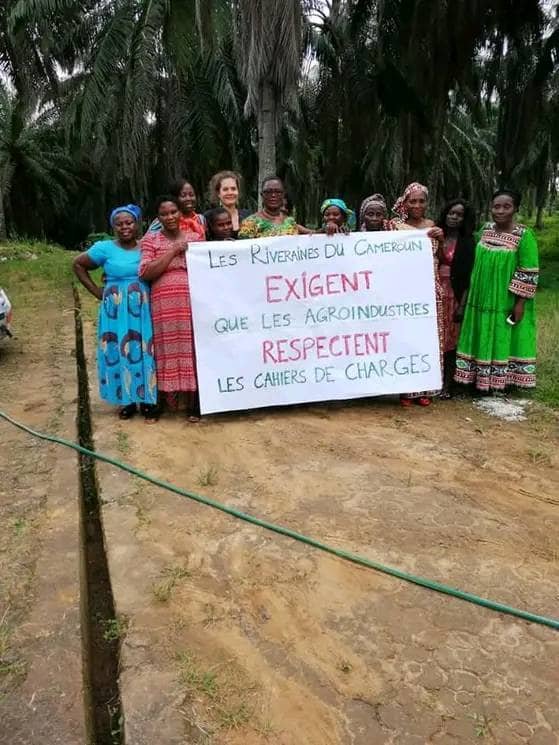
The call made was to provide local residents with tree monoculture plantations in Cameroon. They said extractive industries such as dam projects, extraction of natural gas, coal, and oil, major deforestation for large monoculture tree plantations, infrastructure projects, etc. which are carried by our states and are the main culprits of climate change. These large projects in villages monopolize most of the time essential resources (land, forests, water, air, etc.) used by women and young girls to develop their means of living and to be autonomous, and sheltered from violence. of all kinds and particularly economic violence.
RADD and partners denounce the fact that the State does not guarantee these local women deprived of their resources substantial lasting compensation. As a result, women find themselves abandoned to themselves, risking the worst violence and frustrations of all kinds that undermine their dignity.
Activities marking Day two were focused on the theme: “My land, my life, my workplace”
According to these networks and associations, large-scale plantation development involves the grabbing of traditional customary lands and the destruction of forests and resources that rural women and girls have in their families’ livelihoods. To stop this: We, the neighborhood women say STOP to grabbing by agro-industries and major projects! Respect the minimum strip of 5km around our villages
On Day three focused on the theme: “My water, my life”, it was outlined that Agro-industrial plantations and major projects consume more than half of the world’s drinking water resources, and are responsible for the pollution of surrounding water and groundwater, causing suffering and disease to small farmers and their families. Women and young girls are particularly affected by the consequent violence of this scarcity of drinking water around industrial plantations. This situation is worsening with climate change.
To stop this: « We, the women living near agro industries and major projects, say STOP to the grabbing and pollution of water!!! » That the agro-industries build boreholes for the benefit of the neighbouring villages and that the polluter pays principle applies.
“My health, My life” was theme highlighted on day four by these networks which said large-scale plantations and large projects have a negative impact on women’s health. Companies do not keep the promise to provide efficient health services to local residents. However, many diseases arise as a result of soil and water pollution by chemical inputs from business activities. To stop this: We, neighbourhood women of agro industries and major projects say STOP to the destruction of the physical and mental health of local women and girls. That agro-industries build and equip health centers for the benefit of local residents.
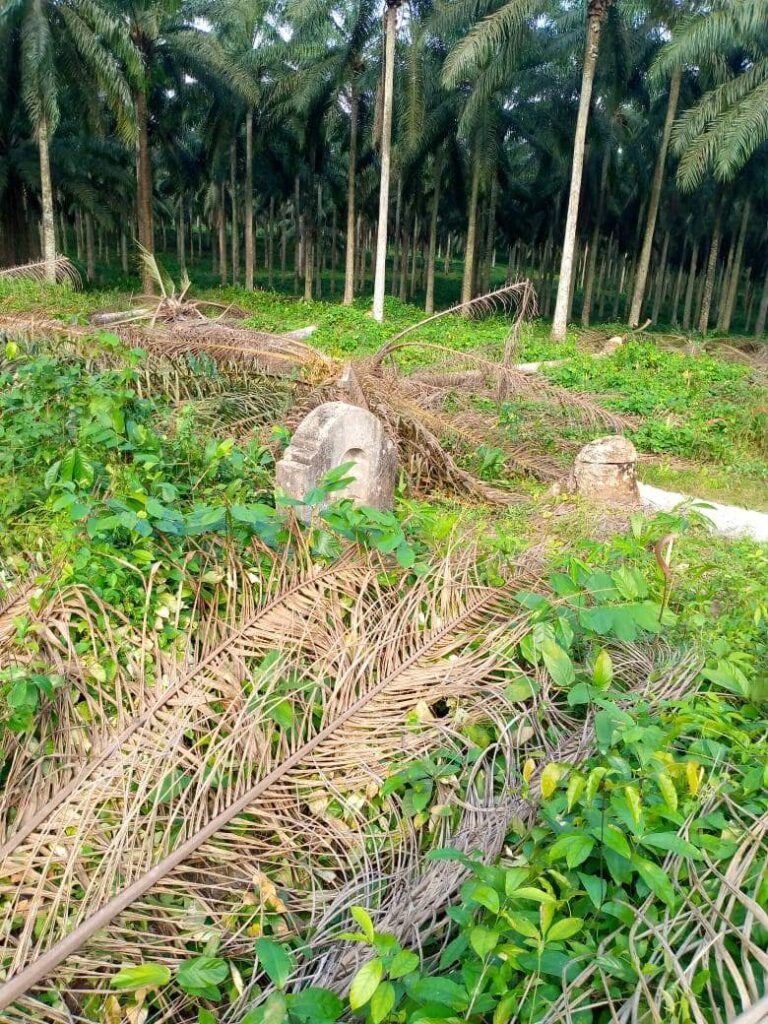
Activities of day 5 centered on the theme: “My good, My life” as stated by these various associations and networks who believe that the implementation of large-scale plantations and major projects are, because of the destruction of goods and resources and the monopolization that it entails, the cause of famines, economic shortages and poverty of the local populations. To stop this: We, the women living near agro-industries and major projects, say STOP to famine and the impoverishment of our families and YES to inclusive and sustainable development.
Day six’ theme was on: My freedom, My life. The agro-industrial companies disseminate barriers and enclosures in the public passageways, dig trenches 4m long and deep in the village said RADD and partners. These restrictions on freedom of movement are amplified by incessant and outrageous checks. The people living near these plantations are forced to travel long distances to access their traditional activities. They end up in green prisons. These numerous attacks on individual freedoms result in the frustration, misery and economic dependence of women and young girls. To stop this: We, the women living near agro industries and major projects, say STOP to attacks on individual freedoms! Freedom of movement is a fundamental Human right.
“Violation of religious and cultural places”, it was the theme chosen to highlight day seven activities. It is said the establishment of agro-industries has taken place without taking into account worship and cultural sites. It literally destroyed the sacred sites, the trees planted on the graves and the places of worship, all this in defiance of the attachment of these citizens to their cultural values. To stop this: We, the women living near agro industries and major projects, say STOP to the violation of religious and cultural sites in these industrial plantations. The cultural and natural heritage of a people is an inalienable good, necessary for its social balance and its development! To deprive it of it is a moral and spiritual violence that particularly affects women and young girls.
Day Eight activities were based on the theme: “My job, my salary, my life”. As once more indicated, the large agro-industrial monoculture companies are responsible for many social injustices against local residents, mainly women, and girls whose labour is abusively exploited. 90% of local women workers in these plantations do not benefit from the minimum wage or social security. They sometimes work without a contract. These indecent working conditions are associated with multiple violations of workers’ rights, and unfair wages, which subject them to economic dependence and extreme poverty. To stop this: We, neighbourhood women, say STOP to slavery and the economic exploitation of women and girls in agro-industrial plantations and major projects. Demand compliance with the social clauses contained in the national labor code and the specifications of these clearly defined companies.

On day nine, focus was on the theme: “My forest, my environment, my life.”
The proliferation of large-scale agro-industrial plantations causes massive destruction of forests and environmental ecosystems, with the direct consequence of the destruction of the livelihoods of local communities and the disappearance of biodiversity, said RADD and key partners.
To stop this: We, neighbourhood women, say STOP to the destruction of forest ecosystems and biodiversity. The forest is the melting pot of socio-economic and cultural values, as well as the memory of traditional knowledge. It is an important source of income and a local pharmacy essential to the well-being and survival of the community.
Day ten’s theme was: “My body, my integrity, my life”
Once more RADD and its various partners denounced the fact that Agro-industrial companies have monopolized all the livelihoods of local women (land, water, freedom, etc.). Unfortunately, the latter must continue to provide food for the whole family. They are forced to enter the plantation which is forbidden to them. It is in the quest for these means of survival that these women encounter all forms of violence (beatings, threats, sexual abuse, blackmail, etc.).
To stop this: We, neighbourhood women, say STOP to the frustrations, violence, and threats that we suffer. The restitution of our lands remains the appropriate solution to all this violence.
On day eleven, calls were made on the theme: “Stop sexual violence and insults against women and young girls. As underscored, violence against women is a flagrant violation of human rights. In areas bordering agro-industries, rape and sexual coercion of women are recurrent in monoculture plantations. Exposed to poverty and unemployment, the young girls are sexually blackmailed by guards installed in the plantations that they roam in search of means of survival (collecting palm nuts that have fallen after cutting, leaves are born to sweep, firewood, etc.); often they are raped, pregnant and children are born of unknown fathers; or they trade sex to survive with alarming consequences such as STDs and STIs.
To stop this: We, neighbourhood women, demand from development partners an active political will in promoting the empowerment of women and young girls through income-generating activities and support for local residents to break the silence. All Together, let’s stand up to end violence against women and young girls living near major projects in Cameroon
On day twelve, the theme was on: “Stop sexual violence against women and girls”.
Sexual violence is recurrent in large-scale monoculture plantations. In these areas bordering agribusinesses, young girls and women too often find themselves forced into the sex trade to survive. In idleness due to the grabbing of their land and without education, they are at the mercy of sexual predators delivering them to prostitution with alarming consequences such as early and unwanted pregnancies, STDs and STIs, etc. Even more, they are the prey of the first comer proposing to marry them in the wedding of « come we stay » (concubinage). These free unions, informal and uncertain, lead in most cases to a sad reality where, after twenty years of living together, the woman is expelled from the home without any consideration.
To stop this: We, neighbourhood women, demand respect for women’s rights at all times and in all places. That the Family Code be made public. All Together Let us rise to put an end to the violence and sexual insults against women and young girls living near agro-industrial plantations and major infrastructure projects in Cameroon.
Day Thirteen paved the way for activities on the theme: “My forest, my food, my medicine, my life.”
Associations and networks engaged in these series of activities said the expansion of agro-industrial monoculture enterprises leads to the deprivation of the enjoyment of multiple rights of local women. The forest, a place of subsistence crops for families, is also a source of non-timber forest products and many medicinal plants that contribute to the well-being of women and neighboring families. They are thus denied access to resources such as firewood, fruit, picking, picking, and consumption of products from their own family production.
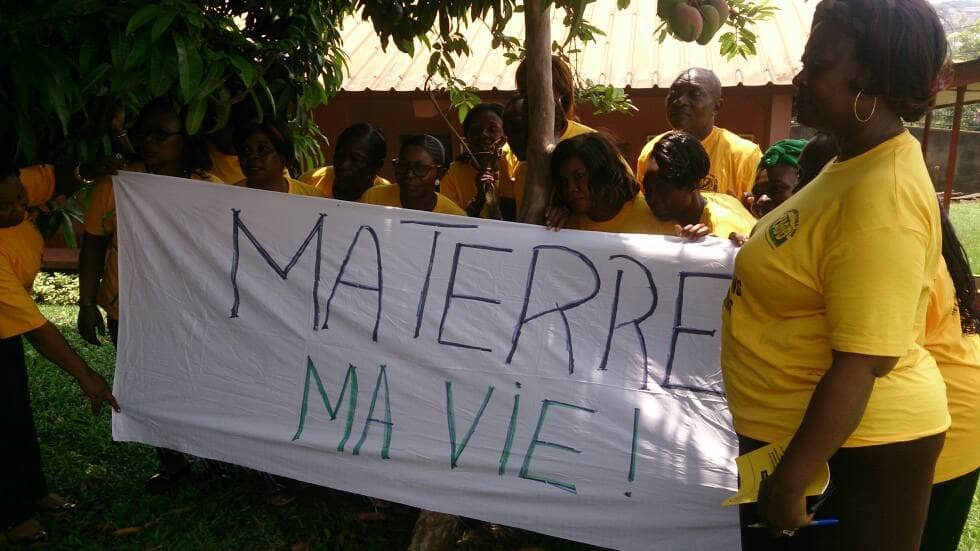
To stop this: We, neighbourhood women, say STOP to the spoliation of the rights of use of the local residents. Access to natural resources is an inalienable right of people living near this environment. Whether in the forest or the savannah, nature is not the private property of multinationals. It is a universal heritage of which the residents are the natural guardians!
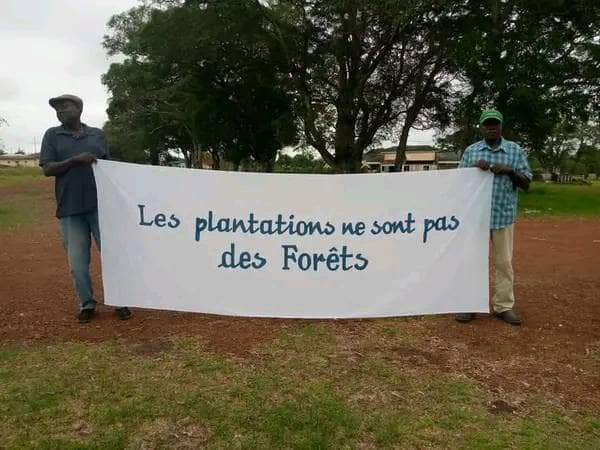
On day Fourteen- “women living near agro-industries left to their own devices.”
According to RADD, J4E, and APPDH-Assistance, studies have shown that monoculture agro-industrial companies are responsible for multiple violence suffered by local residents. The first violence happens to be the grabbing of one’s resources without real, lasting compensation. Faced with these abuses, women are left to their own devices. The administrative, political, judicial, and traditional authorities who are supposed to protect these women are sometimes absent, on the side of the company. Discrimination renders these women and young girls orphans in the face of the pressures imposed on them by this environment. To stop this: Local and national authorities must their responsibility, rethink the methods of land transfer, and ensure compliance with specifications. All rural women must have access to land to produce food for their families and communities.
Day Fifteen was placed under the theme: “My country, the law, my rights.”
They said the establishment of industrial monoculture companies has generated, engendered, and perpetrated numerous acts of violence against the communities, too often qualified as offenses by the authorities questioned. The proven and continuous bad faith of the managers of these agro-industrial companies in the perpetuation of these acts despite the recurring complaints and grievances of the local residents and their supporters sufficiently demonstrates the evidence of the manifest responsibility in the unbridled search for ever more profits. To stop this: We, the women living near agro-industries and major projects say STOP to the impunity of those responsible for monoculture agro-industrial companies. The Civil Code of Cameroon provides that »every act of man which causes damage to another obliges the one by whose fault it happened to repair it ». So, political, administrative, and judicial authorities! Take responsibility and enforce the law! The lives of your populations are at stake.
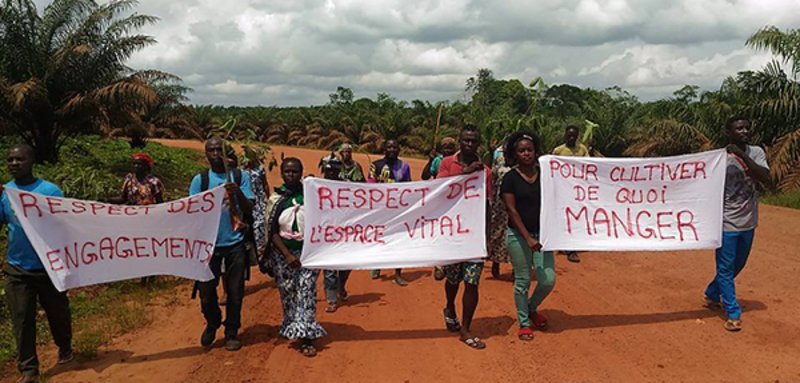
And drop curtains on this 16-day full campaign, day sixteen was dedicated to key points to feature on the press release.
Read the Full Press Release below:
As part of the 16 days of activism against violence towards women campaign, which began on November 25, 2022, the Network of Actors in Sustainable Development (RADD), Journalists for Earth (J4E), the Association for the Defense of Human Rights (APPDH-Assistance) and eight (8) associations of women living around industrial plantations in Cameroon have undertaken to alert decision-makers to the extent of violence suffered by women around extractive projects in Cameroon. These 16 days of activism were an opportunity to denounce the ‘mother violence’ which is the spoliation of their resources by public and private companies and decision-makers. What can a rural woman do without land, without forest, without water, and above all, without substantial and lasting compensation? How will she continue to play her role as nurturing mother of the community? Deprived of their resources, local women are subjected to all forms of abuse and violations of their fundamental rights in the quest for means of survival for their families. They suffer physical, psychological and sexual violence, and serious attacks on their individual freedoms. All this contributes to the loss of their dignity and the many testimonies on their lives are pathetic, sickening and revolting. This is the place for us to use this forum to tell decision-makers: THIS MUST STOP! YES, THIS MUST STOP! If these projects are development projects, they must effectively and sustainably contribute to improving the living conditions of all, without any exclusion. The State of Cameroon, the extractive companies, the administrative, political, traditional and judicial authorities must take their responsibility to put an end to this violence on the communities living around these major projects and extractive industries. These women and young girls did not choose to be born around these great projects. They do not deserve to be condemned to live in distress. Solutions exist and the political will must be expressed : Ø Major extractive projects must return the grabbed land and respect the minimum strip of 5 km around villages to free up vital space, necessary for the development of communities. Local women must be able to practice and develop their social, economic and cultural activities for their empowerment; Ø Neighbourhood women associations must be consulted and effectively involved in the development and implementation of social projects provided for in the specifications of companies, which must be accessible to them; Ø Spaces for dialogue between associations of local residents, companies, CTDs and administrations must be operational. The fight against poverty, against inequalities, against environmental and climate degradation, for the promotion of peace and environmental and climate justice are global commitments made by our States through the SDGs on the horizon 2035. They must be respected to achieve a better and sustainable future for all. It inevitably passes through the abolition of these blatant injustices suffered by hundreds of thousands of women and young girls around agro-industries, major projects, and extractive industries in Cameroon.
TimesNews2




